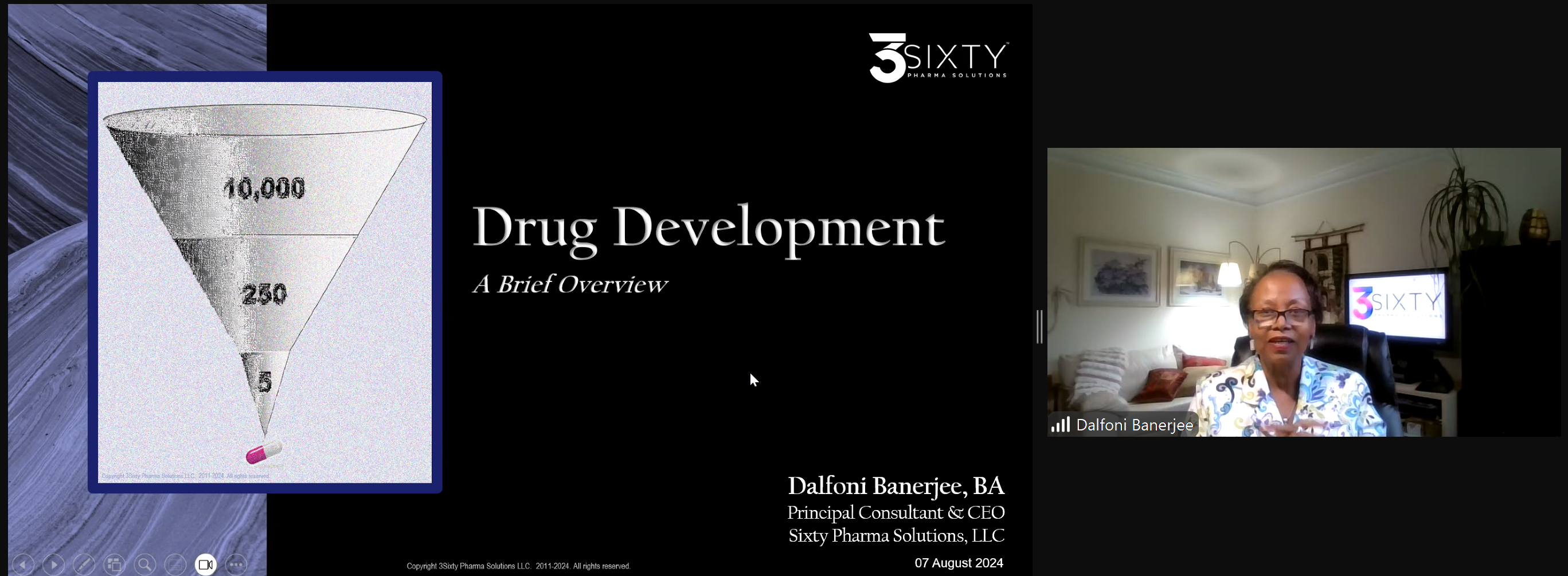According to a 2024 Deloitte report, the world’s top 20 pharmaceutical companies collectively spent $145 billion in research and development (R&D) during 2022-2023. This substantial investment highlights the ongoing pursuit of innovation in medicine.
Recognizing the significance of this effort, the Professional Science Master’s program hosted a session on August 7th as part of the MBS Cafe Series, focused on the drug development process. The event featured a comprehensive talk by Dalfoni Banerjee, an industry expert with over 25 years of experience, who shared her insights into the multifaceted drug development ecosystem. The discussion was facilitated by Rupa Misra, Ed.D., director of our User Experience Design (UXD) and Product Design concentrations.
Banerjee, an award-winning entrepreneur and consultant, founded 3Sixty Pharma Solutions in 2011 with a mission to accelerate drug development and reduce risks for pharmaceutical, biotechnology, and medical device companies. Further demonstrating her commitment to revolutionizing healthcare, she established a biotech company specializing in innovative vaccine production.
Banerjee began the session by discussing the foundational concepts in the drug development process. According to the United States Food and Drug Administration (FDA), a drug is a substance intended for the diagnosis, cure, mitigation, treatment, or prevention of disease, with the ability to alter the body’s structure or function. Banerjee highlighted the critical roles played by various stakeholders in drug development, including pharmaceutical and biotechnology companies, Contract Research Organizations (CROs), hospitals, marketing agencies, pharmacovigilance agencies, and consultants. During the drug development process, the FDA plays a pivotal role in thoroughly reviewing the application of a new drug, ensuring that it is safe and effective before reaching the market.
Throughout the discussion, Banerjee also shared important statistics about the cost and scale of drug development:
- Developing a single drug costs approximately $2.6 billion, according to a study from the Tufts Center for the Study of Drug Development. This includes about $1.2 billion for the cost of time and $1.4 billion in out-of-pocket expenses, covering preclinical research and clinical trials.
- Out of every 10,000 compounds tested in the lab, only one makes it to market as a medicine.
Banerjee then walked the students through the rigorous stages of the drug development process:
- Discovery: Identifying a target and validating it.
- Preclinical: Testing in vitro (test tubes) and in vivo (animal studies) to gather data on safety and efficacy.
- Clinical Research:
- Phase 1: Focuses on safety, often involving healthy volunteers.
- Phase 2: Evaluates both safety and efficacy in a larger group.
- Phase 3: Confirms efficacy and monitors side effects in larger populations.
- New Drug Application (NDA): After completing clinical trials, data is compiled and submitted to the FDA for approval.
Banerjee's talk provided a clear and comprehensive overview of the drug development process, illustrating the immense resources and dedication required to bring a new medicine to market.
Her insights not only highlighted the challenges faced by the industry but also reinforced the critical role of ongoing innovation in advancing healthcare.
For more events like this, visit our events page. You can also follow us on X (Twitter), LinkedIn, Facebook, and Instagram to stay updated.
